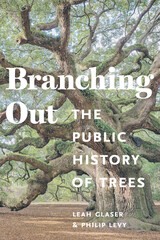
Sarah B. Pralle takes an in-depth look at why some environmental conflicts expand to attract a lot of attention and participation, while others generate little interest or action. Branching Out, Digging In examines the expansion and containment of political conflict around forest policies in the United States and Canada.
Late in 1993 citizens from around the world mobilized on behalf of saving old-growth forests in Clayoquot Sound. Yet, at the same time only a very few took note of an even larger reserve of public land at risk in northern California. Both cases, the Clayoquot Sound controversy in British Columbia and the Quincy Library Group case in the Sierra Nevada mountains of northern California, centered around conflicts between environmentalists seeking to preserve old-growth forests and timber companies fighting to preserve their logging privileges. Both marked important episodes in the history of forest politics in their respective countries but with dramatically different results. The Clayoquot Sound controversy spawned the largest civil disobedience in Canadian history; international demonstrations in Japan, England, Germany, Austria, and the United States; and the most significant changes in British Columbia's forest policy in decades. On the other hand, the California case, with four times as many acres at stake, became the poster child for the "collaborative conservation" approach, using stakeholder collaboration and negotiation to achieve a compromise that ultimately broke down and ended up in the courts.
Pralle analyzes how the various political actors—local and national environmental organizations, local residents, timber companies, and different levels of government—defined the issues in both words and images, created and reconfigured alliances, and drew in different governmental institutions to attempt to achieve their goals. She develops a dynamic new model of conflict management by advocacy groups that puts a premium on nimble timing, flexibility, targeting, and tactics to gain the advantage and shows that how political actors go about exploiting these opportunities and overcoming constraints is a critical part of the policy process.

Trees are not just natural resources; they are also cultural ones that present unique challenges and opportunities for public historians. Trees can serve as important objects of memory, recalling past triumphs or tragedies. They can be the last living witness to important events or community stories. Trees can also be objects of preservation, sometimes as individuals, other times as stands or even forests, all of which can take on historical significance for people, sites, and institutions. But as living entities they defy the kind of permanent legal preservation applicable to buildings and other non-living historical objects. Furthermore, their organic fragility can actually make them significant problems for historical sites and local preservation activities. For example, communities have had to cope with extensive tree loss from storm and fire damage, and dying trees can drop limbs or topple over, creating considerable danger to people and resources. Climate-change-driven increasing storm intensity has also highlighted the ways that trees—however historical or beloved—can become considerable threats.
The fourteen new, previously unpublished essays in this volume explore the many ways that trees are an integral part of public history practice and sites. The authors draw on a range of approaches and historiographies to look at how memories of race-based hate, patriotic stories, community identities, and changed places all have centered on trees. In addition to contributions from the volume editors, this collection features scholarship by Sonja Dümpelmann Andrew Hurley, Carolyn M. Barske Crawford, Brian Dempsey, Liz Sargent, Sasha Coles, Mariaelena DiBenigno, Evan Haefeli, Krista McCracken, Alena Pirok, Christian Kosmas Mayer Alaina Scapicchio, and David Glassberg.
READERS
Browse our collection.
PUBLISHERS
See BiblioVault's publisher services.
STUDENT SERVICES
Files for college accessibility offices.
UChicago Accessibility Resources
home | accessibility | search | about | contact us
BiblioVault ® 2001 - 2024
The University of Chicago Press









